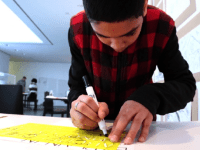8 Play-Based Strategies to Engage Youth in Learning
Play is something that comes naturally to young people, so why not enhance their learning opportunities by engaging them to play with purpose?
Your content has been saved!
Go to My Saved Content.Editor's Note: Ann Saylor, co-founder of the YMCA Center for Asset Development, co-authored this post.
Play is a powerful strategy for putting into action many of the ideas suggested by research and social science. For example, inherent within play you can find challenge, novelty, and movement -- all elements that help engage the brain and keep it healthy. Play builds communication and social skills, teaches self-awareness, and can be used to help build social-emotional learning (SEL) skills. It contributes to both personal and group development, and it is a venue for helping youth decompress.
Added to all of that, play isn't a hard sale on youth -- they're the natural experts when it comes to play. Play is their work and their way of connecting to the world. In play they come alive, are actively engaged and present. It just makes common sense to make play a common practice in your toolkit to help youth learn.
Consider these eight play-based strategies to build your group and help them learn about themselves, each other, and what you need them to learn.
1. Start the group off right.
Use name games to help youth quickly bond and get to know everyone in the group. Knowing names and using them is a powerful tool in helping youth feel accepted and eventually safe.
2. Use icebreakers to help the group build relationships.
Games like Two Truths and a Lie are always a fun way to learn interesting things about others, helping you really think about that person as you consider what might be true and not true.
3. Push to deepen relationships beyond naturally-forming cliques.
Games like Behind Every Name allow participants to know each other more deeply than just names. In triads, each person shares the "why" behind their name, if they were named after someone, if they like their name . . . This game creates a sense of family and possibly cultural pride.
4. Use games to establish group norms or rules.
Start by grouping youth into favorite sports (basketball, soccer, etc.). In self-selected groups, have them think of one rule from that sport and the consequence for breaking it. Have them report out. Chart these reports. Use the list to ask how each rule and consequence might translate to the full group and how you want to play well together.
5. Build emotional intelligence.
Using index cards with an emotion written on each one, have youth act out the emotion while others try guessing what it is. This will help them learn to read emotional cues in others -- an important skill in life.
6. Let them teach each other.
In the game Tiny Teach, people pair up, and each person teaches his partner something he knows how to do (or something about the subject you're going to discuss). After five minutes, the leader asks for volunteers to demonstrate what they've learned from their partner. (If playing this game for highlighting individual knowledge, give a few examples to illustrate what they might share, such as how to shoot the perfect free throw, how to count to five in Japanese, or a favorite recipe.)
7. Tap into creativity and music.
Use familiar tunes to have youth create a song based on the content being learned. In teams of three, have each person write down two words that come to mind regarding the subject. Then give them five minutes to create a song using all six words to the tune of their choosing. (In our brain training, we used a camp tune to teach about three important parts of the brain.)
8. Do a 30-Second spotlight.
In table teams, give each person 30 seconds to share all he or she knows about a subject. When time is up, as you switch talkers at each table, you can also switch topics. This can be used as a get-to-know-you activity or as a content review.
Our mantra "play with purpose" has worked well for us over our years in working with young people. We hope you will find that, to your delight, it adds life and energy to your interactions and teachable moments with youth.
And please let us know how you play with purpose in your classroom or school.
